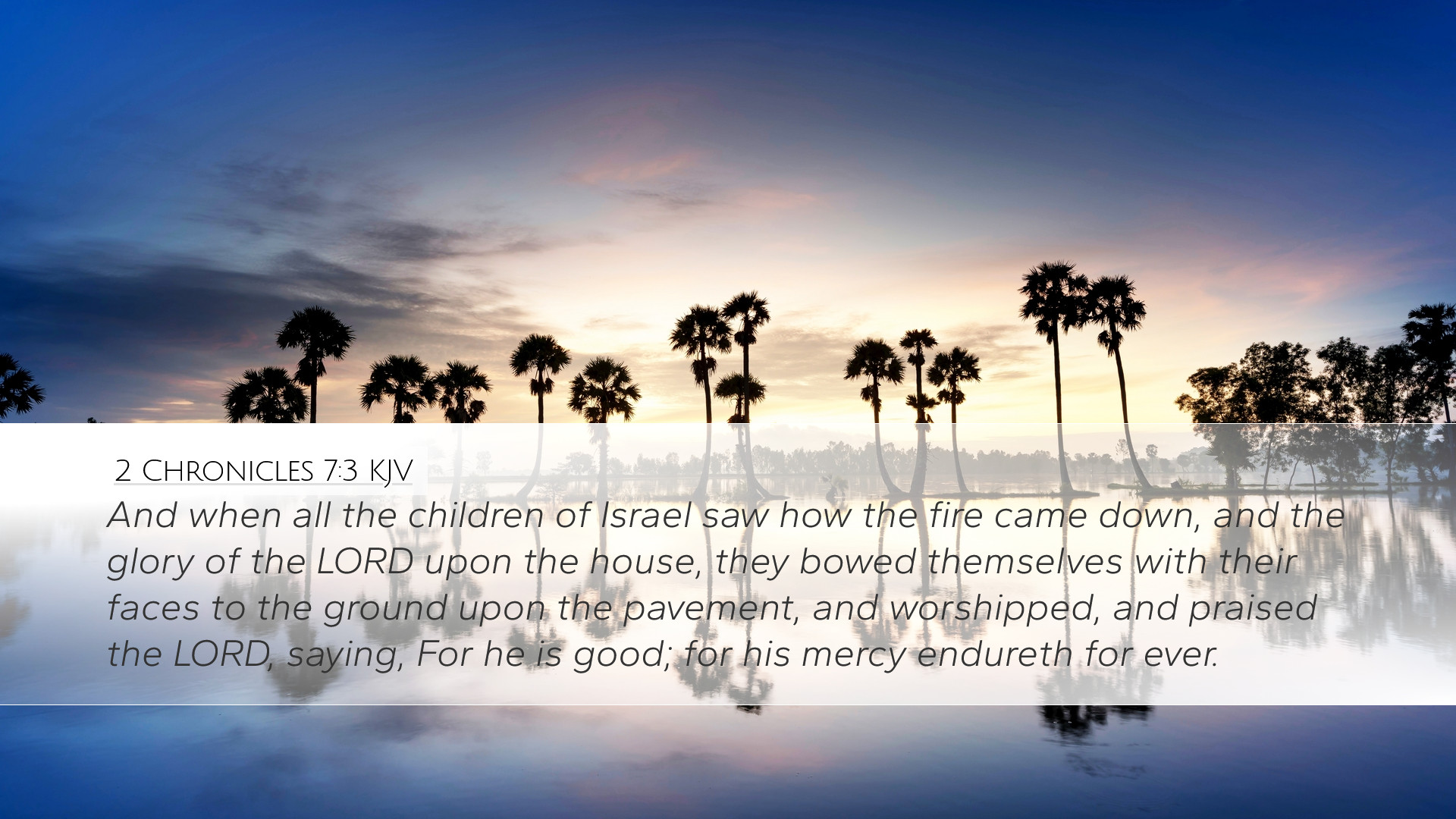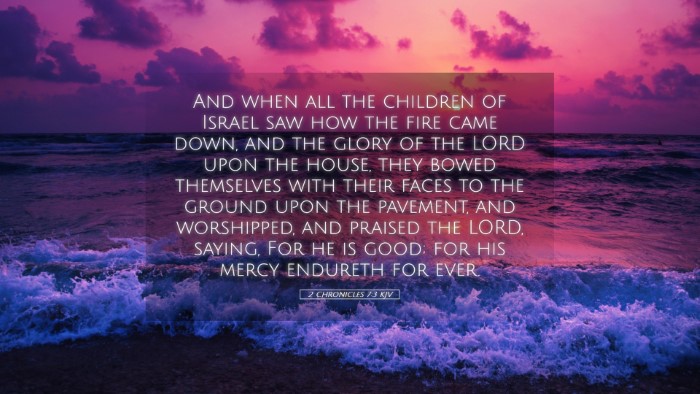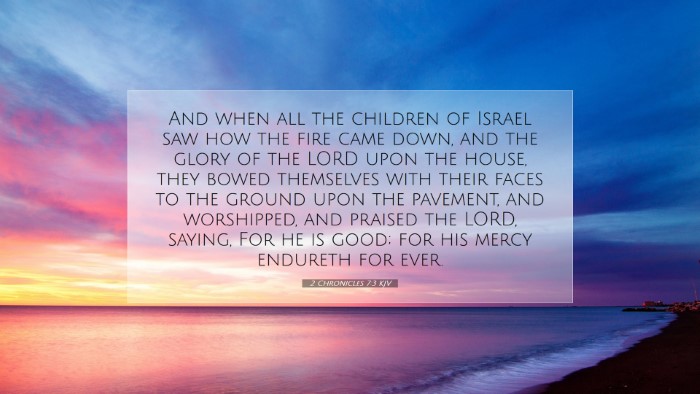Commentary on 2 Chronicles 7:3
Text of the Verse: "And when all the children of Israel saw how the fire came down, and the glory of the Lord upon the house, they bowed themselves with their faces to the ground upon the pavement, and worshipped, and praised the Lord, saying, For he is good; for his mercy endureth forever." (2 Chronicles 7:3, KJV)
Introduction
This verse serves as a pivotal moment in the narrative of 2 Chronicles, depicting the divine approval of Solomon's temple. The expression of worship by the Israelites indicates a significant spiritual awakening in the context of their covenant relationship with God. This commentary synthesizes insights from notable public domain scholars such as Matthew Henry, Albert Barnes, and Adam Clarke, emphasizing its theological implications for worship, divine presence, and communal reverence.
The Glory of the Lord
Divine Manifestation: The phrase "the glory of the Lord" marks a divine manifestation that is both extraordinary and transcendent. According to Matthew Henry, this visible sign emphasized God's acceptance of Solomon's temple as a dwelling place among His people. The glory serves as an assurance of God's presence; not only does it indicate approval, but it also symbolizes the covenantal relationship established with Israel.
Worship as Response: The sight of divine fire descending upon the temple catalyzed a profound response from the people. Albert Barnes illustrates that the act of bowing down and worshipping signifies deep reverence and acknowledgment of God's sovereignty. This reflects a communal response to divine awe, showcasing the importance of collective worship within the community of faith.
Theological Implications
This passage offers rich theological implications regarding worship and mercy. The call to recognize God’s goodness and enduring mercy becomes a central theme in Israel’s relationship with God.
Worship as a Collective Experience
Corporate Worship: The Israelites' response was not individual but collective, suggesting that worshiping together reflects community identity in acknowledging divine grace. Adam Clarke emphasizes the significance of this corporate act; it united the people in a powerful acknowledgment of their covenantal relationship with God, reinforcing the idea that worship must be a shared endeavor.
The Nature of God’s Mercy
Understanding Divine Mercy: The phrase "for he is good; for his mercy endureth forever" encapsulates a central tenet of Israel’s faith. As highlighted by Henry, this declaration reminds the Israelites and contemporary believers that God’s mercy is not only active but eternal. It provides comfort and assurance, emphasizing that no matter the circumstances, God’s character remains constant.
The Role of Remembrance in Worship
Recalling Past Acts: The Israelites' declaration serves as a reminder of God’s past faithfulness and ongoing mercy. Barnes points out that remembrance in worship is crucial for building faith; it brings to mind the historical acts of God that warrant worship. This act of remembering cultivates a deeper understanding of God’s nature and invites believers to trust in His future promises.
Practical Applications for Contemporary Worship
Encouragement for Modern Believers: This verse transcends the historical context, offering substantial lessons for contemporary worshippers. The collective worship experience, recognition of divine mercy, and encapsulation of community faith shape how churches today approach worship.
Encouraging Unity in Worship
Congregations can strive for experiences that encourage unity in worship similar to that of the Israelites. Clarke admonishes modern churches to create environments where worship is inclusive and participatory, drawing believers together to collectively honor God. This unity mirrors the biblical paradigm and ensures that worship remains a shared and transformative experience.
Confession and Praise
The practice of confession and praise in corporate worship reflects the essence of the Israelites’ response. Henry notes that believers today should emphasize praise as a response to recognizing God’s goodness, infusing worship services with both confession of sins and exuberant thanks for God’s mercy.
Continual Remembrance of God’s Faithfulness
Modern worship practices should include elements that encourage congregants to remember and celebrate God’s faithfulness. Barnes encourages believers to integrate testimonies and scriptural recitations that remind congregants of God’s past blessings as a catalyst for future faith.
Conclusion
The profound response of the Israelites in 2 Chronicles 7:3 sets a precedent for worship that emphasizes the importance of communal recognition of God’s glory and mercy. Scholars like Matthew Henry, Albert Barnes, and Adam Clarke enrich our understanding of this verse through insights about divine presence, community worship, and the eternal nature of God’s mercy. As modern believers reflect on this passage, it serves as a reminder to engage deeply in worship, acknowledge God’s goodness, and live out the reality of His enduring mercy in their lives.


